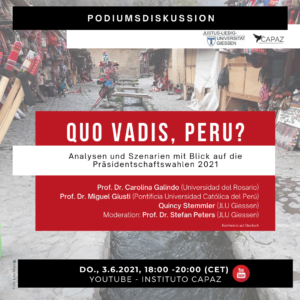
(Deutsch unten)
The online debate organised by CAPAZ and Justus Liebig University, Giessen is called “Quo vadis Peru? Analysen und Szenarien mit Blick auf die Präsidentschaftswahlen 2021” (Quo vadis Peru? Analysis and scenarios ahead of the presidential election in 2021).
The discussion to be held on Thursday, June 3, 2021 and 6:00 p.m. (German time) will be in German.
Those interested can follow and participate in the event live on the CAPAZ YouTube channel
Special guests include:
- Prof. Dr. Carolina Galindo (Universidad del Rosario)
- Prof. Dr. Miguel Giusti (Pontificia Universidad Católica del Perú)
- Quincy Stemmler (JLU Giessen)
- Moderator: Prof. Dr. Stefan Peters (JLU Giessen)
Context:
Peru’s presidential election will be held on Sunday, June 6, 2021, in a context of a three-dimensional crisis (health, economic, and political) as well as a coronavirus pandemic. In just one year, three governors passed through the country’s presidency. The first round of the presidential elections revealed the institutional crisis and the lack of representation of the political class. None of the candidates received more than 20 per cent of the vote each. The winner of the first round, Pedro Castillo, and the candidate Keiko Fujimori will meet, from opposite sides, in the decisive vote. The round table discussion will analyse how they have reached this point in the presidential race and the possible social, political, and economic scenarios for Peru’s future.
Deutsch:
“Quo vadis Peru? Analysen und Szenarien mit Blick auf die Präsidentschaftswahlen 2021” heisst der virtuelle Roundtable des Deutsch-Kolumbianischen Friedensinstituts – CAPAZ und der Justus-Liebig-Universität Gießen.
Die Veranstaltung findet am Donnerstag, den 3. Juni 2021, 18 Uhr (DE) statt und wird auf dem YouTube-Kanal des Instituto CAPAZ (Konferenz auf Deutsch) live übertragen.
Es diskutieren:
Prof. Dr. Carolina Galindo (Universidad del Rosario)
Prof. Dr. Miguel Giusti (Pontificia Universidad Católica del Perú)
Quincy Stemmler (JLU Gießen)
Moderation: Prof. Dr. Stefan Peters (JLU Gießen)
Kontext:
Am Sonntag den 6.6. wählt die peruanischen Bevölkerung in einer Stichwahl ein neues Staatsoberhaupt. Die Wahl erfolgt im Zuge einer Dreifachkrise (gesundheitlich, ökonomisch und politisch) ausgelöst bzw. verstärkt durch die Coronapandemie. Seit März 2020 brach die Wirtschaftsleistung um über 10% ein und in nur einem Jahr regierten drei Präsidenten das Land. Die Ergebnisse der ersten Runde der Präsidentschaftswahlen haben die Krise und sowie die mangelnde Repräsentativität in der politischen Landschaft verdeutlicht. Kein:e Kadidat:in konnte mehr als 20 % der Stimmen erzielen. In der Stichwahl treten mit dem Überraschungssieger des ersten Wahlganges Pedro Castillo und Keiko Fujimori zwei Personen von den Rändern des politischen Spektrums gegeneinander an. Castillo repräsentiert die marxistisch-leninistische Kleinpartei Perú Libre, die eine neue Verfassung sowie einen radikalen Wandel des derzeitigen ökonomischen Modells fordert. Keiko Fujimori auf der anderen Seite, Tochter des autoritären Präsidenten Alberto Fujimori (1990-2000), fordert Kontinuität und einen Regierungsstil der harten Hand. Der Wahlausgang erscheint auch kurz vor den Wahlen vollkommen offen. In der Podiumsdiskussion werden die Gründe für den Einzug von Castillo und Fujimori in die Stichwahl analysiert und mögliche wirtschaftliche, soziale und politische Szenarien für die Zukunft des krisengeschüttelten Landes diskutiert.
(NW: CAPAZ, JLU Gießen. Traducción libre: Claudia Maya. Inglés: Tiziana Laudato)
